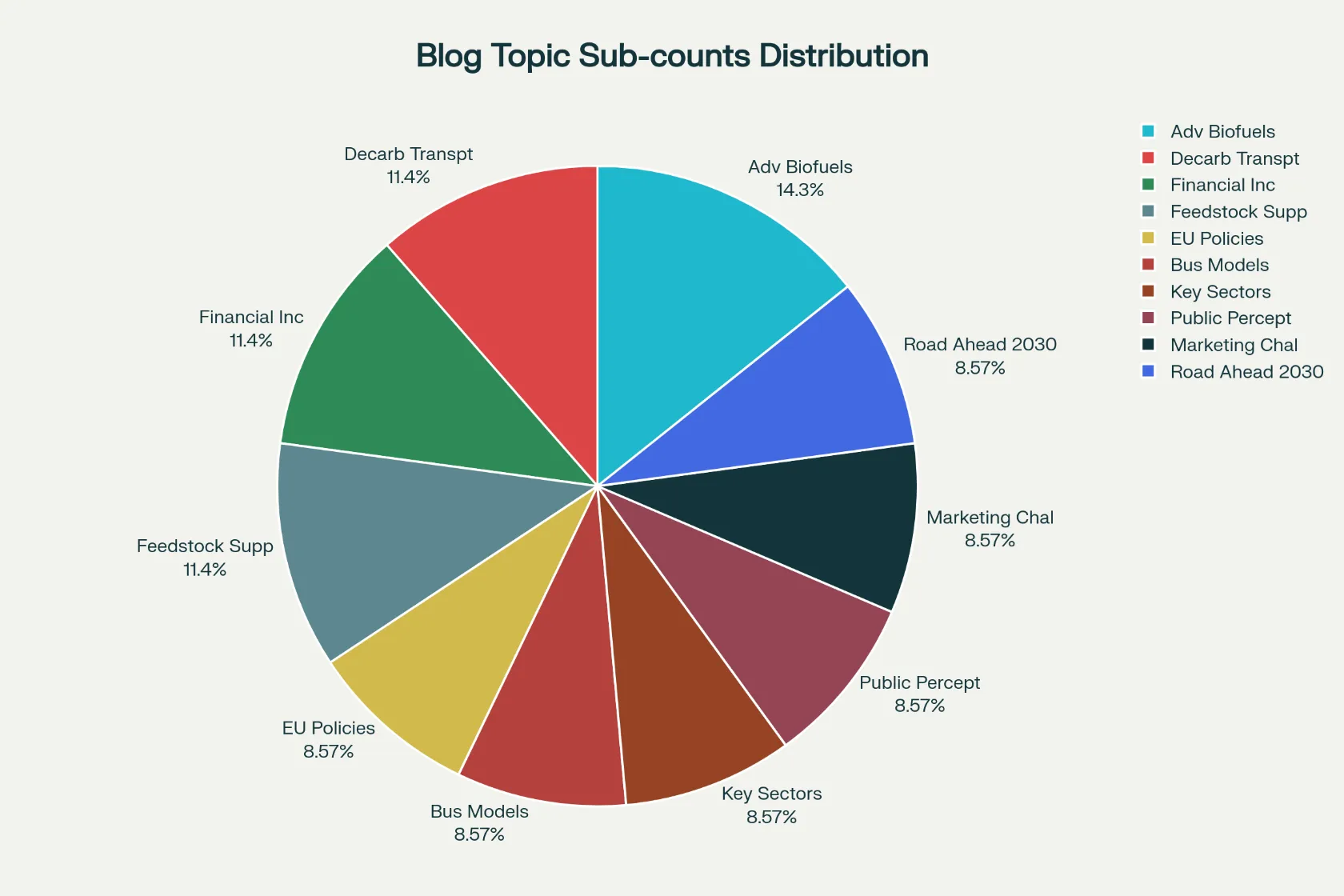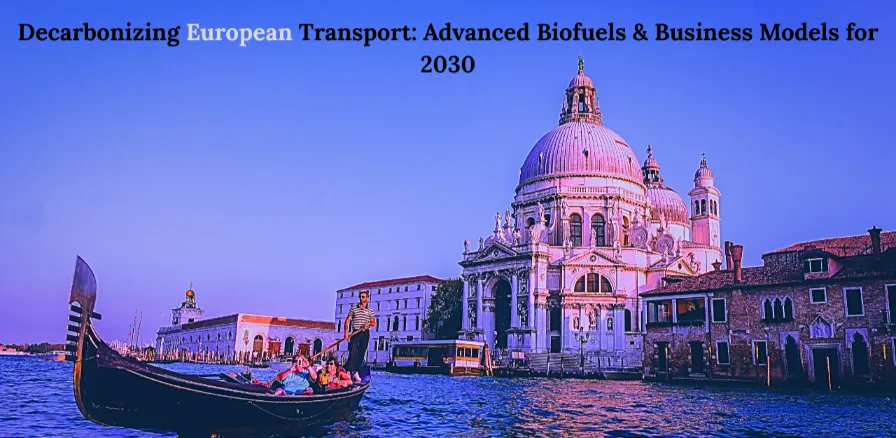
Decarbonizing European Transport: Advanced Biofuels & New Business Models for 2030
The urgent push to decarbonize European transport by 2030 is driving innovation and transformation across sectors. While elecCarbon abatement costs for advanced biofuels vary widely. For example, cellulosic ethanol exceeds €200/tCO2eq, and advanced biodiesel can surpass €300/tCO2eq, making them less cost-effective than crop-based bioethanol or biomethane, which have lower abatement costs (De Jong et al., 2018). Practical constraints that make advanced biofuels a crucial solution for cutting greenhouse gas emissions and enabling sustainable mobility. These next-generation biofuels, supported by EU policies, emerging business models, and shifting market dynamics, are reshaping European transport’s future.
Advanced Biofuels: A Sustainable Alternative for Hard-to-Electrify Transport
The EU’s Renewable Energy Directive (RED II) sets ambitious targets to increase renewable energy use in transport, with a strong focus on advanced biofuels sourced from non-food feedstocks. These include sustainable bio-jet fuels, bio-diesel, hydrotreated vegetable oil (HVO), biomethane, and power-to-liquid (PtL) fuels. Unlike first-generation biofuels that competed with food crops, advanced biofuels harness waste materials, residues, and dedicated energy crops, ensuring environmental and social sustainability.
Advanced biofuels (second-generation, from lignocellulosic materials or waste) currently have higher production costs than both fossil fuels and first-generation biofuels. By 2030, costs may approach those of first-generation biofuels, but only under favorable technological and market conditions (Oehmichen et al., 2021).
Advanced biofuels can seamlessly integrate into existing fuel infrastructure with minimal modifications, offering a practical decarbonization pathway especially for aviation, maritime shipping, and heavy freight. Early adoption helps companies meet stringent emissions targets while maintaining operational reliability.
Leading Transport Companies Driving the Biofuel Shift
European transport industry leaders are embracing advanced biofuels as part of their sustainability strategies:
- Aviation: Airlines such as Lufthansa, KLM, and SAS are integrating Sustainable Aviation Fuels (SAFs) into regular flight operations. They are investing in fuel production, partnering with biofuel producers, and exploring PtL technologies to meet and exceed regulatory blend mandates, appealing to eco-conscious travelers.
- Maritime shipping: Giants like Maersk and CMA CGM are trialing bio-diesel and biomethane for container fleets, developing green corridors, and innovating engine technologies to handle biofuel blends, aiming to drastically cut emissions from global shipping logistics.
- Road freight: Logistics providers including DHL and DB Schenker are switching to HVO and biomethane for trucks, enabling immediate emissions reductions without the need for new vehicle fleets. They are also investing in refueling infrastructure and waste-to-fuel feedstock projects to secure supply chains.
These companies leverage their purchasing power and brand influence to accelerate the market entry of advanced biofuels, underpinning the broader decarbonization agenda.
Tackling Public Perception: Building Trust and Awareness
Despite the environmental benefits, public understanding of advanced biofuels remains limited due to past controversies around first-generation biofuels. Transparent communication about sustainable feedstock sourcing especially from waste and residues—is essential to reshape perceptions.
Key public engagement strategies include:
- Educating consumers on the circular economy benefits where waste is converted into clean energy.
- Differentiating advanced biofuels clearly from earlier biofuel generations linked to deforestation and food competition.
- Using credible certifications like ISCC to build trust.
- Highlighting examples such as flights powered by fuels derived from used cooking oil to boost consumer confidence.
Effective public outreach not only fosters acceptance but also creates consumer-driven demand for sustainable transport options.
Overcoming Marketing Challenges: Making the Invisible Visible
Marketing biofuels faces inherent challenges because the environmental benefit is not physically visible in the vehicle or vessel. Companies must therefore:
- Use transparent certification to authenticate fuel sustainability.
- Quantify emissions reductions in relatable terms (e.g., tons of CO2 saved equivalent to cars taken off roads).
- Collaborate with fuel producers and partners to amplify messaging.
- Tell engaging stories about fuel production journeys from waste to wheels or wings.
- Develop “green miles” brands or labeling that enable consumers and businesses to choose and support sustainable fuel use explicitly.
Such approaches help make the value of advanced biofuels visible and compelling across diverse audiences and stakeholders.
Financial Incentives: Essential for Market Growth and Investment
Advanced biofuels currently incur higher production costs than fossil fuels, making financial incentives vital to close the price gap and drive scale. Key mechanisms supporting adoption include:
- Tax reductions or exemptions on sustainable biofuels.
- Binding blending mandates and tradable renewable fuel certificates.
- Grants and subsidies for building advanced bio-refineries.
- Carbon pricing mechanisms such as Emissions Trading Systems expanding to shipping and road transport.
- Public procurement policies favoring biofuel use in government fleets.
These incentives de-risk investments, stabilize the market, and create financial viability for producers and transport companies alike.
Securing Sustainable Feedstock Supply Chains
Feedstock availability is the foundation for scaling advanced biofuels sustainably. These sources include:
- Agricultural and forestry residues (straw, wood chips, thinnings).
- Used cooking oil and animal fats (waste streams).
- Municipal solid waste and industrial waste.
- Algae (emerging R&D feedstock).
- Dedicated energy crops grown on marginal, non-arable land.
Collaborations between biofuel producers, waste managers, farmers, and forestry industries optimize collection and logistics, while sustainability certifications prevent competition with food production or land-use change. Investment in strategically located bio-refineries near feedstock sources is critical to cost-effective supply chain development.
The Road Ahead: A Transformative Decade for European Transport
Aviation and maritime sectors are prioritized for advanced biofuels due to limited electrification options, but the cost gap with fossil fuels persists. For example, renewable jet fuel costs are projected to remain €7–13/GJ higher than fossil jet fuel by 2030, requiring policy mechanisms to bridge the gap (Carvalho et al., 2021).
By 2030, advanced biofuels will be a cornerstone of Europe’s decarbonized transport ecosystem, especially in sectors where electrification faces barriers. This transition will unlock innovative business models, from integrated green supply chains and circular logistics to carbon offsetting schemes linked to biofuel use.
Europe’s transport industry is poised for a green revolution where advanced biofuels are not just an alternative fuel but a strategic enabler of sustainable economic growth and a cleaner mobility future. The challenge lies in coordinated efforts across policy, industry, public engagement, investment, and innovation to ensure these fuels achieve their full potential.
CITATIONS
De Jong, S., Van Stralen, J., Londo, M., Hoefnagels, R., Faaij, A., & Junginger, M. (2018). Renewable jet fuel supply scenarios in the European Union in 2021–2030 in the context of proposed biofuel policy and competing biomass demand. GCB Bioenergy, 10, 661 – 682. https://doi.org/10.1111/gcbb.12525.
Oehmichen, K., Majer, S., & Thrän, D. (2021). Biomethane from Manure, Agricultural Residues and Biowaste—GHG Mitigation Potential from Residue-Based Biomethane in the European Transport Sector. Sustainability. https://doi.org/10.3390/su132414007.
Carvalho, F., Portugal-Pereira, J., Junginger, M., & Szklo, A. (2021). Biofuels for Maritime Transportation: A Spatial, Techno-Economic, and Logistic Analysis in Brazil, Europe, South Africa, and the USA. Energies. https://doi.org/10.3390/en14164980.
Financing Opportunities for First-of-a-Kind Advanced Biofuel Plants
